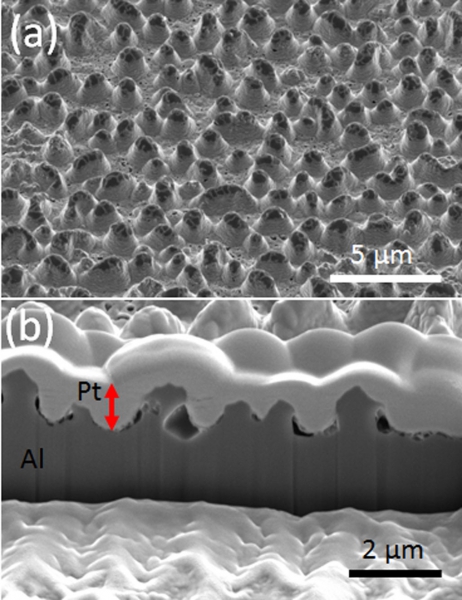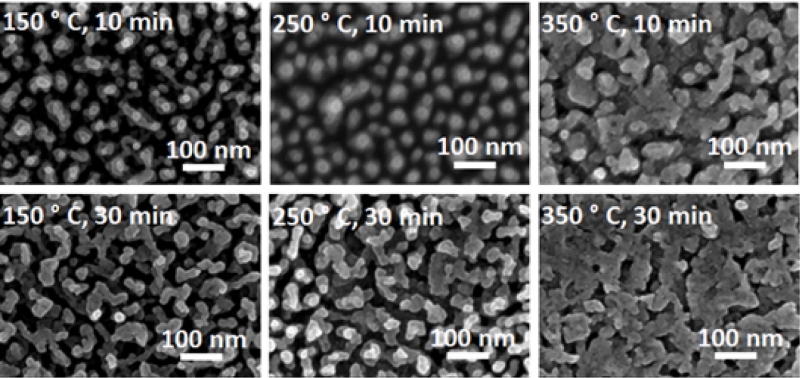29 April 2015
Materials scientist Irem Tanyeli from energy research institute DIFFER has discovered how you can make nanostructures grow in a controlled manner on a variety of metals by bombarding the metals with helium particles. Such nanostructures to order provide the possibility of advanced electrodes that produce sustainable fuel using solar energy. Tanyeli and her fellow researchers from DIFFER, ITER and the University of Basel publish their results in Nature Scientific Reports.
I. Tanyeli et.al, Nature Scientific Reports, doi: 10.1038/srep09779

A nanostructured electrode produced from widely available iron can use sunlight to cheaply produce the energy carrier hydrogen on a large scale. Source: ICMS / DIFFER
That helium plasma can cause a metal to explode in nanostructures had previously been discovered when researchers tested wall materials for fusion energy reactors. In a fusion reactor these nanostructures are undesirable because they reduce the discharge of heat, but in other applications the nanostructures are very usable, thinks co-researcher and DIFFER director Richard van de Sanden.
 Overview (a) and cross-section (b) of nanostructures on an aluminium surface.
Overview (a) and cross-section (b) of nanostructures on an aluminium surface.
Source: Tanyeli et al. / Nature Scientific Reports

Growth of nanostructures on a copper surface at different temperatures and exposure times.
Source: Tanyeli et al. / Nature Scientific Reports
Systems using widely available and cheap materials open up possibilities for the large-scale storage and conversion of sustainable energy in the form of chemical compounds: solar fuels. Such fuels have no net CO2-emission and therefore offer opportunities for the transport sector. Solar fuels are seen as an important way of storing sustainable energy, for example the solar energy that is generated during the sun-rich summer can be stored for use during the dark winter.
Materials scientist Irem Tanyeli from energy research institute DIFFER has discovered how you can make nanostructures grow in a controlled manner on a variety of metals by bombarding the metals with helium particles. Such nanostructures to order provide the possibility of advanced electrodes that produce sustainable fuel using solar energy. Tanyeli and her fellow researchers from DIFFER, ITER and the University of Basel publish their results in Nature Scientific Reports.
Reference
Surface Modifications induced by high fluxes of low energy helium ionsI. Tanyeli et.al, Nature Scientific Reports, doi: 10.1038/srep09779

A nanostructured electrode produced from widely available iron can use sunlight to cheaply produce the energy carrier hydrogen on a large scale. Source: ICMS / DIFFER
Blowing bubbles in metal
In their research Tanyeli and her colleagues exposed different metal surfaces to a hot intense beam of charged helium gas (plasma) in DIFFER's plasma experiment Magnum-PSI. Helium easily penetrates into the metal lattice where it forms bubbles that push the surrounding metal outwards. In this way, different metals give rise to different structures of tens to hundreds of nanometres in size. By analysing the differences, Tanyeli could analyse which underlying processes such as the temperature and the structure of the metal lattice formed the nanostructures.That helium plasma can cause a metal to explode in nanostructures had previously been discovered when researchers tested wall materials for fusion energy reactors. In a fusion reactor these nanostructures are undesirable because they reduce the discharge of heat, but in other applications the nanostructures are very usable, thinks co-researcher and DIFFER director Richard van de Sanden.
 Overview (a) and cross-section (b) of nanostructures on an aluminium surface.
Overview (a) and cross-section (b) of nanostructures on an aluminium surface. Source: Tanyeli et al. / Nature Scientific Reports
Fundamental insight
"Irem Tanyeli's research is important because it gives fundamental insight into the phenomenon", says Van de Sanden. "How do such nanostructures grow on a surface, which processes play a role in that, what are the bottlenecks, and how can you manage the process? If you understand these processes, you can think about producing advanced materials with properties to order on a large scale." That has a wide range of applications in sustainable energy technology.
Growth of nanostructures on a copper surface at different temperatures and exposure times.
Source: Tanyeli et al. / Nature Scientific Reports
Converting sunlight into hydrogen
Tanyeli's nanostructures are interesting for catalyst applications such as the use of solar energy to produce hydrogen from water. Widely available and cheap materials can usually not compete against the efficiency of expensive but rare record holders such as platinum. With the right nanostructures, however, the cheaper materials can be made competitive.Systems using widely available and cheap materials open up possibilities for the large-scale storage and conversion of sustainable energy in the form of chemical compounds: solar fuels. Such fuels have no net CO2-emission and therefore offer opportunities for the transport sector. Solar fuels are seen as an important way of storing sustainable energy, for example the solar energy that is generated during the sun-rich summer can be stored for use during the dark winter.
Go to the News page.